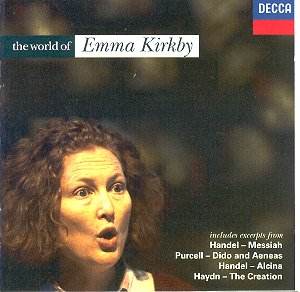The World of Emma
Kirkby
Handel. Tornami a vagheggiar
Purcell. Thanks to these lonesome
vales
Dowland. I saw my Ladye weepe
Handel. But who may abide the day
of his coming? If God be for us
Lampe. Pretty warblers
Gibbons. The silver swan
Vivaldi. Nulla in mundo paz sincera
Morley. With my love
Pergolesi.Salve regina
Arne. By the rushy-fringed bank
Haydn. On mighty pens
Mozart. Ch'io mi scordi di te? K505
 Emma Kirkby,
Anthony Rooley
Emma Kirkby,
Anthony Rooley
Academy of Ancient Music Christopher
Hogwood
 Decca 467 781-2
[66.00]
Decca 467 781-2
[66.00]
Crotchet
AmazonUK
AmazonUS

Despite my resistance to compilations which provide minimal information about
the music, this one is irresistible. The well chosen sequence comprises excerpts
from Decca releases from 1975 to 1993 and Emma Kirkby's art is at
its finest (she continues now in excellent voice and it is always a joy to
hear her in live concerts). There are songs with lute (Anthony Rooley,
her long-time collaborator) and madrigals with The Consort of Music,
of which she has been a constant member, always recognisable on the top line.
With The Academy of Ancient Music/Christopher Hogwood she sings arias
from Purcell to Mozart (K505 with fortepiano obbligato, Steven Lubin)
and several from oratorios.
Described as the one voice with the sound of 'early music', she avoided
succumbing to the traditional training for sopranos, eschewed vibrato, and
her pure white sensation created a sensation when she first appeared, rather
as had Alfred Deller, mapping the way for the future of the counter-tenor,
which we now take for granted. The 'modern limit' of her repertoire seems
to be late eighteenth century, but her recordings encompass an extraordinary
range of rediscovered rarities; here, the least known name is John Frederick
Lampe, whose Pretty warblers is exactly up her street.
Emma Kirkby's diction is as clear as you have any right to expect from a
soprano and the titles give a sufficient clue to the words. One can catch
most of the words, and many phrases, but poems as a whole remain elusive.
Hopefully the pleasure this release will assuredly give may lead to exploration
of her other, fully documented CDs.
Peter Grahame Woolf

